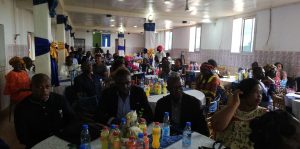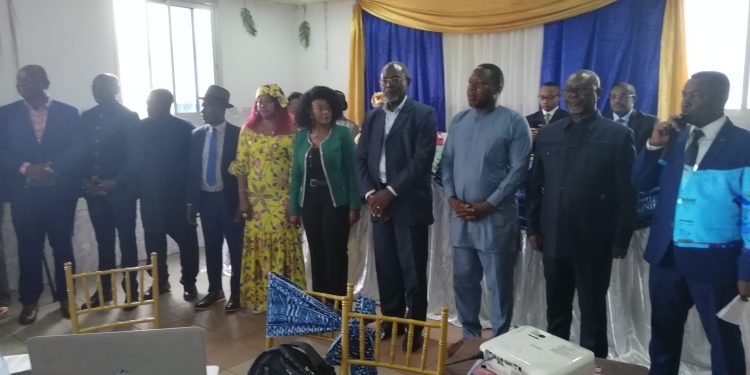Story, Louvier Kindo Tombe
The comming together of founders of lay private schools and training institutions (SYNAFESFPLA) in Cameroon is timely. The challenges facing the sector are calling, and the actors believe it is time to tackle them accordingly.
“We cannot achieve excellence if we do not work together as a team,” says François Wacgue, pioneer president of SYNAFESFPLA.
He was speaking as he chaired the extra ordinary general assembly of the trade union that held in Yaounde, June 7, 2023 with the aim of presenting the union officially to the public in general and to aspiring members in particular.
During the assembly, the pioneer executive bureau of the national trade union headed by Mr. Wacgue François, was also presented as well as the objective of the trade union.
The objective of the trade union is not only to bring the proprietors together, but most especially to act as a bridge between the different lay private establishments and the government of Cameroon.
Deliberations during the extra ordinary general assembly centered around assembling ideas, and collecting challenges to beef up a strategic plan of action that will guide the activities of the union to meet meet its goals.
The strategic plan

Two major axes will constitute the strategic road map of the national trade union of founders of lay private schools and training institutions.
The members will on one hand organise capacity building and training seminars among themselves to master the different texts and laws governing private education in Cameroon. On the other hand, they will be lobbying for a better regulation of the sector by the different competent arms of the government.
Their lobby will target the Prime Minister’s office, the Ministry of Finance, Public Health, Agriculture and Rural Development, Directorate of taxation, Special Council Support Fund for Mutual Assistance (Feicom), not leaving out the different ministries in charge of education in the country.
One of the major projects will be to draft an integrated fiscal partnership with the taxation.
“We want to avoid the fact that fiscal controls are done inside schools, we intend to sign an agreement for the controls to be done at the level of our respective structures,” says François Wacgue.
The founders of lay private establishments and training institutions in Cameroon regret the fact that the president dispositions in the country classify their activity under Non Governmental Organizations, which is not the case.

“We are not NGOs, we are education establishments and should be classified as such,” François Wacgue said.
They have started drafting a project in that light.
One of their lobby activities directed towards the Ministry of Finance concerns the finance law which according to them, has been revised scrapping certain autonomy of management from lay private establishments, meanwhile they are actually the backbone of education in the country.
Strength of lay private establishments
A study conducted by SYNAFESFPLA indicates that lay private establishments in Cameroon constitute a greater majority in nursery education compared to public schools. The train far more pupils than public schools. The figures start to drop at the level of primary schools. According to officials of the trade union, there is need to work towards upgrading the figures, and that is the mission of the union.
Lay private establishments in Cameroon currently employs 80,500 teaching staff in both nursery, primary and secondary education, about 1/3 the number employed by the state.
The above figures and many more, make them a force to reckon with.
At the end of the extra ordinary general assembly, attended by the Divisional Officer for Yaounde IV, the pioneer executive bureau of SYNAFESFPLA pledged to work in collaboration with the government of Cameroon and abide by the laws and texts in force in the country.








